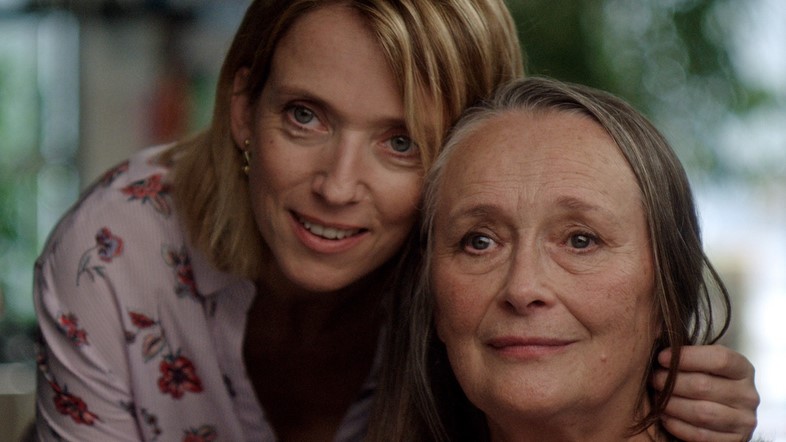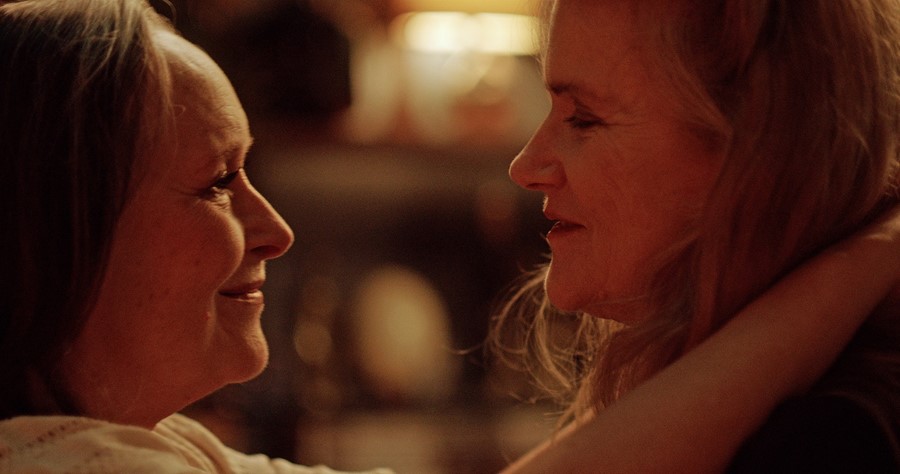“I wanted to show age for what it is, with wrinkles and everything, while also showing that you can be 70 with wrinkles and still be alive and kicking,” director Filippo Meneghetti tells Nick Levine
Two of Us, the supremely moving debut feature from director Filippo Meneghetti, is a covert queer love story with a twist. Pensioners Madeleine (Martine Chevallier) and Nina (Barbara Sukowa) live across the hall from one another in a small French town. Even Madeleine’s grown-up children Anne (Léa Drucker) and Frédéric (Jérôme Varanfrain) think they’re just neighbours, but the truth is much more interesting. For years the two women have been conducting a clandestine romance while Madeleine’s kids delude themselves that she’s still in thrall to their late father. But in reality, as soon as they leave following a family supper, Nina is waiting in the corridor to return to Madeleine’s apartment.
The heartbreaking twist comes when Madeleine suffers a stroke which leaves her mute and inert. Her children hire a lacklustre live-in carer (Muriel Bénazéraf), but for some reason Nina – to them, simply the kind woman opposite, at least initially – keeps finding reasons to pop in and help. It’s a suffocating scenario from which Meneghetti extracts an impressive amount of tension, especially when Nina secretly lets herself into Madeleine’s apartment late at night so she can spend time with her largely unresponsive lover.

Meneghetti says Madeleine and Nina’s relationship was loosely inspired by two queer women who “passed on the passion of cinema” during his teenage years. “They went through some very difficult times,” the Italian director says dolefully over Zoom. “The story in this film is invented, but my friends’ story is actually much harder – if I told you it, you wouldn’t believe me.” Meneghetti says he was so touched by what the real-life couple went through that he felt a “responsibility’’ to share it with an audience, albeit in an abstract way. When he visited a friend’s apartment block and saw two older women living across the corridor from one another, pinging between homes for platonic company, he realised he had the perfect “visual metaphor” for his story.
Meneghetti also wanted his film to address what he calls “cinema’s problem with age”. The queer love stories we see on screen tend to involve relatively young people, while for decades Hollywood has paired ageing leading men with actresses in their twenties and thirties. It shouldn’t be unusual to see two septuagenarian women being intimate with one another, but sadly Two of Us still feels noteworthy for including beautifully tender romantic moments between Madeleine and Nina. “We live in a society that is pretty much obsessed with youth and the perfection of the body,” the director says. “So I wanted to show age for what it is, with wrinkles and everything, while also showing that you can be 70 with wrinkles and still be alive and kicking.” Indeed, in one of the film’s most striking scenes, Nina’s growing frustration erupts in a way that comprehensively smashes the ‘docile old granny’ trope. No one in this film behaves impeccably all the time, which only makes it more vivid.
Meneghetti’s film explores emotions ranging from violent rage to piercing grief, but he says “self-censorship” is a key theme. Because Madeleine has grown up with the idea that a woman should fall in love with a man, then start a family, she carries a deep internalised shame for turning her back on this heteronormative ideal. Although her relationship with Nina is much more enriching than the one she had with her domineering husband, she feels compelled to compartmentalise it and keep it secret. “She loves her children and family so much that she’s worried she might lose that if she lives [openly] with Nina,” Meneghetti says. “In Italian we have an expression – ‘trying to keep one foot in two shoes’ – and that is really Madeleine’s life. And you know, I don’t judge her for that, because it is very difficult to balance the two things. I know this because I saw it first-hand [in the real-life couple].”
It’s this depiction of love prevailing against the odds – albeit in a way that might feel compromised or constricted to some viewers – that makes Two of Us so poignant. Meneghetti says that after a screening in Thessaloniki, Greece, an older woman approached him to say that she had never properly understood her daughter’s queerness untii watching his film. “You know, I made this film thinking about two people in particular that were so important in my life,” he says humbly. “And then it comes out and you realise that you made it for so many other people in the world that you don’t even know. This story resonates with them, and that’s a kind of magic that I don’t believe many things besides cinema can achieve.”
Two of Us is in UK cinemas and available on digital now.
